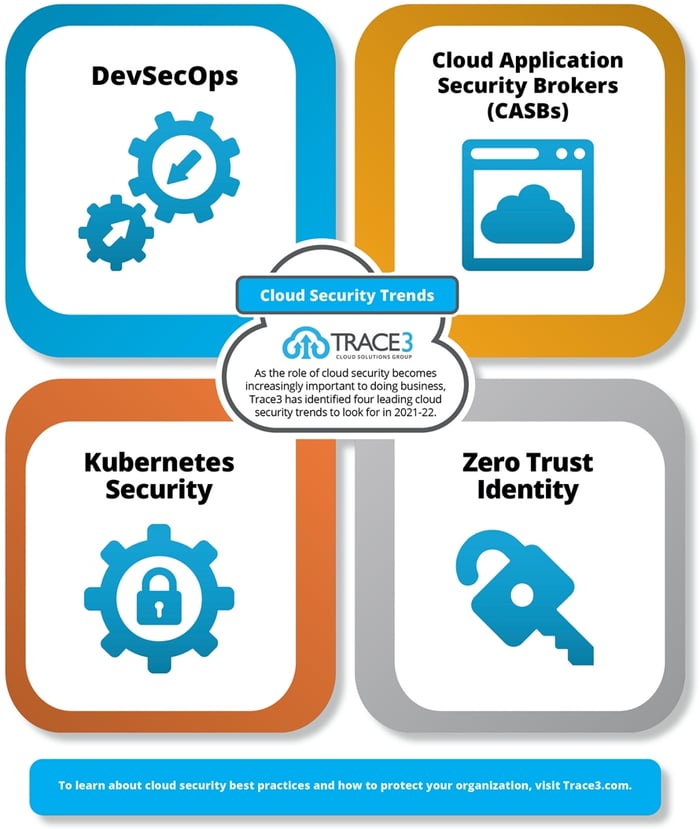The State of Cloud Security—Trends to Watch Now and Into the New Year
By Derek Smith | Trace3 Cloud Evangelist


Derek works as a Cloud Evangelist at Trace3. As part of the Cloud + Azure team, he engages with clients to help transform their business applications, operations, and initiatives to the Azure Public Cloud. Additionally, Derek also regularly serves within the Azure Community as a mentor, public speaker, content creator, and enthusiast for all things Azure Public Cloud. Outside of work, you’ll typically find Derek enjoying time with his two kids, reading, snowboarding during the winter, or playing video games. Check out Derek on social media:
LinkedIn: http://linkedin.com/in/considercloudwithderek
Twitter: https://twitter.com/ConsidercloudDS?s=20
Instagram: https://www.instagram.com/considercloudds/
As the role of cloud security becomes increasingly important to doing business, Trace3 identified four leading cloud security trends for 2021-22.
TREND 1: DevSecOps
With organizations adopting DevOps methodologies at hyperspeed, the need to evaluate risk and uncertainties within the code has become even more paramount. Known as a “shift left” mentality, this movement is driving security to be integrated within the code seamlessly as opposed to a layer around or on top of the code. Along with DevSecOp processes, tooling can augment your developer’s capabilities to remediate issues earlier within your Software Development Lifecycle (SDLC). This approach drives greater value to the organization, with the focus on quality being at the forefront of the SDLC, you will save time and money.TREND 2: Cloud Application Security Brokers (CASBs)
As more organizations consume cloud services, it has become increasingly difficult for IT business units to gain visibility into all aspects of an organization’s cloud posture. While the cloud provides flexibility to consume on demand, many enterprises need to balance supporting access while protecting corporate data. CASBs act as gatekeepers to broker access in real time to cloud services. By providing granular visibility into and control over user activities and sensitive data, CASBs address the gap within organizations around the use of cloud services.
TREND 3: Kubernetes Security
Kubernetes is taking the IT world by storm, whether running it open source in an on-prem environment or leveraging a managed offering from GCP, AWS, or Microsoft Azure. The technology offers the ability to run containers at scale incredibly efficiently and with relative ease to manage. However, one inescapable issue remains: its lack of built-in security. Kubernetes requires self-configuration when deploying from open source—which is what makes managed offerings, or the work being done for you, look so attractive. The technology typically requires expertise to deploy workloads securely, meaning someone who is poised to consider the workload configuration, cluster configuration, networking, and infrastructure.TREND 4: Zero Trust Identity
Within the context of cloud, we consistently hear how Identity is the new edge. With traditional data center boundaries being abstracted away, organizations are adopting new security paradigms to secure data, applications, endpoints, and cloud infrastructure. Coupled with the evolving threat landscape, the latest security model addresses these challenges—Zero Trust. Whether the identity is a person, a service, or device, there is a control plane that grants access to the resource, data, or application. Ensuring that the identity is protected with strong authentication, preferably passwordless. The solution is to provide conditional access policies to gate activity, provide remediation, and manage entitlement.
Derek works as a Cloud Evangelist at Trace3. As part of the Cloud + Azure team, he engages with clients to help transform their business applications, operations, and initiatives to the Azure Public Cloud. Additionally, Derek also regularly serves within the Azure Community as a mentor, public speaker, content creator, and enthusiast for all things Azure Public Cloud. Outside of work, you’ll typically find Derek enjoying time with his two kids, reading, snowboarding during the winter, or playing video games. Check out Derek on social media:
LinkedIn: http://linkedin.com/in/considercloudwithderek
Twitter: https://twitter.com/ConsidercloudDS?s=20
Instagram: https://www.instagram.com/considercloudds/
Tags:
Cloud Security

